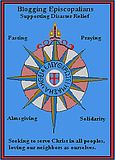Incarnation among the Tinsel
I preached this twice yesterday, in two different congregations 110 miles apart. Then crawled up into the choir loft at my husband's church, because apparently I hadn't said the Nicene Creed enough for one day. This morning I'm home, husband's off to do Christmas morning, I'm claiming 220 miles and 3 services as a Sunday exemption, Hootie is looking miserable from his cold, and I have to wrap husband's presents before he gets back from church. Happy Christmas!Christmas Eve, 2005
Luke 2
One of my Christmas jobs as the only child in our house growing up was to set up the crèche. Each December, we would bring out the tattered cardboard box, and remove the figurines from the fading egg crate foam that cradled each piece, and I would set them up one by one, in the lean-to that came with this nativity set, under the tree. Cattle and shepherds, and the Holy Family itself. My final touch, every year, was to hang a few strands of tinsel over the top edge of the lean-to, you know, for the realism of winter in the desert. I looked forward to it every Christmas, as I looked forward to going to Midnight Mass with my parents, and the utter stillness that hushed even a busy city like Chicago on Christmas Eve. The story and the night seemed like magic, like anything was possible in our little family and our little church.
A lot has changed in my life since then, and I’ve actually spent Christmas in the desert, and I know that there probably weren’t any icicles, tinsel or otherwise. And I know now that there are four gospels, each one with a slightly different perspective on Jesus, and that the Christmas story we think of, thanks to pageants and all that, is actually a mishmash of the Gospels of Matthew and Luke, and that even the details are different between the Gospels—that it’s only in Luke’s Gospel that Mary and Joseph travel to Bethlehem for the census. It’s only in Luke that we have shepherds and angel choirs, swaddling clothes in the stable because there was no room at the inn.
I know all those things, and I’m an adult now, with grownup concerns and cares, and lists, and sermons to write, and I’m well-educated about Scripture, and savvier about the ways of the church, but the power of this night, of this story, of that crèche, hasn’t gone away for me at all. But, it’s not magic that entrances me now, it’s not just a charming little story with a newborn sleeping among softly mooing cattle and fuzzy warm sheep.
Because now I have some understanding of what Luke was trying to tell us in this story. The powerful Roman emperor orders a census to be taken, and probably revels in the fact that at his word, people will travel just because he said so. But for all his power, it’s not in Rome that God is choosing to break forth. It’s not even in Jerusalem. It’s in a tiny country town of Bethlehem, in a stable, among the animals.
And those who attend his birth—it’s not the finest doctors money can buy. It’s not the cream of Judea’s social crop. There will be no pictures taken of those who gathered for his birth, no baby showers. The Messiah was born among the poorest of the poor, the lowest of the low. Shepherds were invited to attend to this baby—homeless, and dirty, and smelling of sheep and the outdoors. God chose the homeless shelter instead of the birthing suite to bring the salvation of the world into our midst.
And now I understand that the baby figure I put in the crèche every year wasn’t just something cute and tiny, but the fullness of God poured into the human body. Our God loves us so much, was so desperate to bridge the gap between human and divine, that God was willing to take God’s very self, divine being, and risk it in pregnancy, and childbirth, and infancy. God was willing to take on all our joys and sorrows, our sickness and health.
This story has such power that it has survived everything we have thrown at it, Frosty the Snowman, the Grinch, and Santa Claus at every mall, and badly rehearsed Christmas pageants, and stuffy piety. It has survived those who want to say it’s not true, and those who try to preserve it in some sort of treacly Norman Rockwell pose. The power of this story is because it could only come from God. Left up to us it would be a magical fairy tale about princes and princesses, with castles and fairy godmothers, and at some point we would leave it behind with the tinsel icicles and the tooth fairy.
This story tells us something about the kingdom God intends to build, about the places God can be found in, about who God will invite first to the table. And this is the God I want to follow; this God is worth everything I can give him, not just tinsel and presents, but all of me, as God is giving all to us in Jesus, at this table, in this bread and wine.
Christina Rossetti’s poem, set to music in our hymnal, says it best:
Love came down at Christmas,Love all lovely, love divine;Love was born at Christmas,Star and angels gave the sign.
We have a loving God who chose to born into our disappointments and our dark corners, into our losses and fears. A God who is full of wonder and mystery, and yet literally down to earth. And so, even though the crèche is buried somewhere in my parents’ basement, and I haven’t draped a tinsel icicle in years, I will gaze in wonder and awe at the babe in the manger, rejoicing with shepherds and angels at the glory of his birth.

























4 Comments:
Beautiful. I know just what you mean about the incredible power of this story. I felt this even more strongly than last year, in fact. How beautiful it all was!
We used some prayers they use in the CofE (you can find them here) - a sort of litany in which every verse begins "In this holy night...." (One of these goes this way: "In this holy night heaven is come down to earth, and earth is raised to heaven." Everything starts to shine and glow, for me, at that point. Incarnation and blessing.)
Our rector hit some of the same notes in his sermon that you did, too: comparing Christ the King with the earthly Caesar, and noting that shepherds weren't even allowed to come to the Temple - that's how unacceptable they really were. He asked: "In this holy night, do you think, or do you hope, or do you know that Christ is King - and that Caesar isn't?" (Not too good a paraphrase, there, I'm afraid, but that was the gist. It was pretty good - especially because so many people come to midnight mass who don't come much at other times. It packed a good punch, I though.)
Glad you're safe home from all that driving, and by now your husband is, too. Happy Christmas!
Thanks, bls. Thanks especially for the link. And I'm going to have to steal that line about Christ being king and not Caesar (always appreciate a good use of words).
Glad you had a blessed Christmas as well. As I was writing this sermon, it occurred to me that as painful as the strife in the church has been, certain parts of the faith have become clearer to me than ever before.
Happy Christmas to you and yours!
"As I was writing this sermon, it occurred to me that as painful as the strife in the church has been, certain parts of the faith have become clearer to me than ever before."
You know, I've been thinking exactly the same thing.
Maybe that's the whole reason for all this; maybe we're supposed to get clear on what our faith consists of, and this was the way it was supposed to happen. Maybe it was the only way.
And I don't feel worried anymore, or hurt or bothered the way I used to, at all. I feel calm and hopeful and peaceful about things these days. Isn't that amazing?
Somehow, I think something important is happening for a lot of us. Maybe we'll see it clearer soon. I think things are going to be all right, though. I haven't felt so happy in a long, long time.
Just dropping in to say Merry Christmas, Emily!
Post a Comment
<< Home